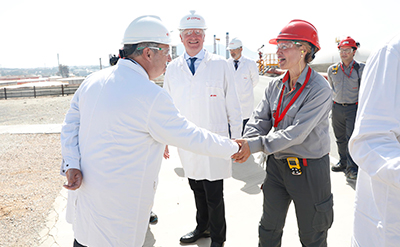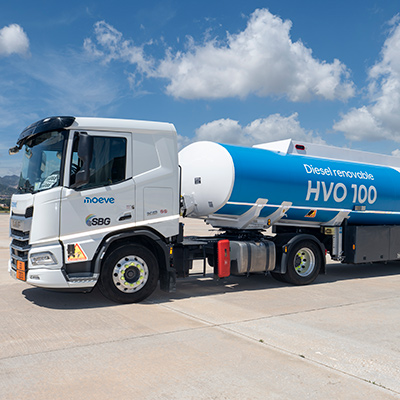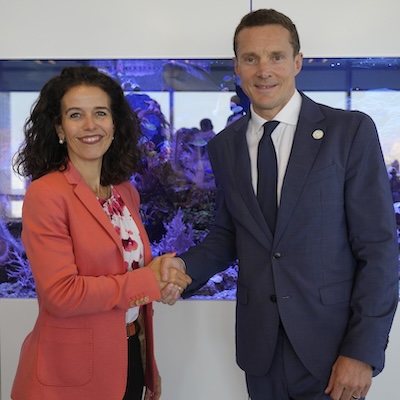- Cepsa CEO Maarten Wetselaar and his executive team update the Minister of Industry and Tourism on the company’s green hydrogen projects, second-generation biofuels, sustainable chemistry, and the transformation of its energy parks, along with a tour of the San Roque Energy Park facilities in Cádiz
- The Company will invest 5 billion euros in Andalusia before the end of the decade, including the development of new sustainable energy projects to advance its energy transition and decarbonize other industrial sectors, transportation, and tourism
During the visit, Cepsa officials highlighted progress in the different projects designed to decarbonize the company’s own operations, as well as those in other industrial sectors and in transportation and tourism. These efforts are centered on producing renewable fuels based on green molecules, particularly hydrogen and its derivatives, and second-generation biofuels. With its Positive Motion strategy, the Company aims to lead hydrogen and biofuel production in Spain and Portugal by 2030, with plans to invest 5 billion euros in Andalusia.
As part of this strategy, Cepsa’s Energy Parks are expected to integrate many new sustainable energy solutions, focusing on the incorporation of green hydrogen and biofuels into their processes, enhancing circularity, digitalization, and continuous operational improvements, while also capitalizing on their logistical advantages.
At the end of the visit, Jordi Hereu highlighted that “I want to highlight the importance of the industrial enclave and the significant space for quality tourism represented by the Campo de Gibraltar. There are many projects here that form a major part of the Government’s industrial transformation process. I love getting an on-the-ground view of how European funds are starting to help generate industrial projects in line with the important strategies of large industrial groups.”
Cepsa CEO Maarten Wetselaar said, “I’d like to thank the Minister for visiting our facilities and for his interest in advancing new industrial projects in Spain that will drive economic growth and create quality jobs, like those that we are developing in Andalusia to support the decarbonization of important sectors such as transportation and tourism. At Cepsa, we are developing some of the largest projects in Europe to further the energy transition, strengthen our energy autonomy, and build a competitive industry that fosters new value chains.”
Alongside the Minister and Cepsa’s CEO, the meeting was attended by members of Cepsa’s executive team and other officials, including Blanca Flores, the Deputy Government Representative in Cádiz, and Juan Carlos Ruiz Boix, the Mayor of San Roque.
During the visit, Cepsa updated the Minister on the Andalusian Green Hydrogen Valley, set to be one of Europe’s largest green hydrogen production centers. This project will decarbonize industry, aviation, and heavy maritime and land transportation, establishing Spain as a leader in sustainable energy exports. The initiative will involve an investment of 3 billion euros and create 10,000 jobs, including direct, indirect, and induced positions. Cepsa plans to use renewable electricity and wastewater in the production process to reduce freshwater consumption and support a circular economy.
In parallel, the company, in collaboration with Bio-Oils, is building the largest second-generation biofuel plant in Southern Europe in the province of Huelva. With an investment of up to 1.2 billion euros, this facility will produce 500,000 tons annually of sustainable aviation fuel (SAF) and renewable diesel, contributing to the decarbonization of air, maritime, and land transportation.
The San Roque and Palos de la Frontera Energy Parks have also increased their capacity for co-processing second-generation raw materials. The company is already producing SAF, renewable diesel, and sustainable marine fuels at these facilities.
Cepsa’s Chemicals business in Andalusia is progressing towards more decarbonized solutions. The company has become the first in the world to produce biodegradable detergent raw material (LAB) with a carbon footprint up to 80% smaller and has pioneered the production of phenol from single-use plastics.
Cepsa has also launched a new line of business with the construction of an isopropyl alcohol (IPA) plant in Huelva. IPA, used in the production of hand sanitizers, will be produced using green hydrogen and will replace fossil-based feedstocks with sustainable alternatives, making it the first facility of its kind in Spain.
Contributing to Andalusia’s industry and economy
Cepsa has been a major player in Andalusia for over 50 years, making significant contributions to the region’s economy and industry. The company ranks among the top Andalusian firms in terms of revenue and exports, contributing more than 9% to the regional GDP. Cepsa’s facilities in Andalusia provide direct employment to nearly 3,000 people and support over 9,000 additional jobs indirectly, including those in over 600 local businesses it partners with. In addition to its European benchmark industrial facilities, Cepsa operates more than 260 service stations in Andalusia, supplies marine fuels at key ports, and hosts its first wind farm in the region.




